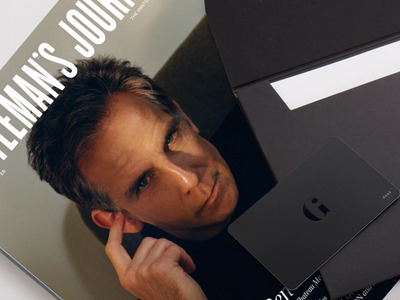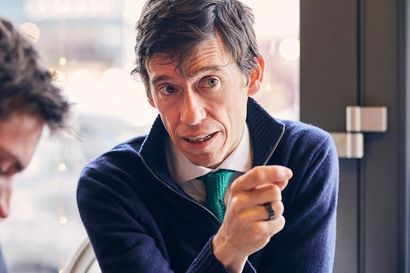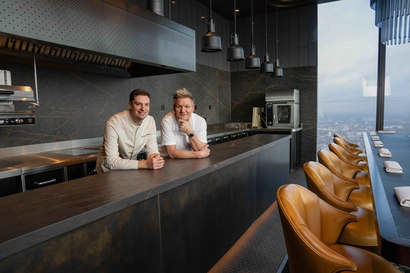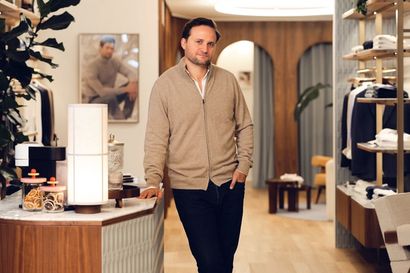Ben Elliot doesn’t do small talk. In fact, he doesn’t really do small anything. Ben is six foot lots, has a deep, resonant voice, and boasts legs so long he can cross them twice.
When I meet him over tea (and yes, fine, a biscuit or six) at Alfred’s on Davies Street, he is wearing a sleek charcoal power suit, his four-button cuff undone all the way. Professional yet pally? Tailored but relaxed? In the Establishment but not of it? You pick the inference, friend, I’m just here for the cut-price therapy (and yes, why not, some more shortbread if there’s some going).
Within minutes of me perching on a Chesterfield, Ben has dilated on the changing fortunes of journalism, asked me what I really want to do with my life, and touched on some very powerful friends by first name only. When the waiter, Máté, comes over to top up the tea, he quizzes him languidly about Viktor Orban and the state of Hungarian politics. These are all uncynical plays from the Ben Elliot School of Hard Work.
"I wasn’t particularly intimidated by anything at all..."
“If you go through life not looking up and not asking people about stuff, I think that’s weird,” he says. “And I think it’s rude as well. You’ll be less interesting and do less interesting things.” In Ben’s case, those interesting things include, but aren’t limited to: the founding of perhaps the world’s premiere concierge service, Quintessentially; the setting up of a multi-million pound charitable foundation; the masterminding of a London mayoral campaign; and the ruddering of The Centre for Policy Studies think tank.
He doesn’t just have his fingers in pies — he’s the piemaker-in-chief (and probably looks pretty sharp in a chef’s hat, too.)
“My attitude has always been: ‘yes, why not, let’s go do it’,” he says. “If you asked my mum and dad what I was like as a child, they were always shocked — I wasn’t particularly intimidated by anything at all.” A great deal of that brio is genetic. “One of my heroes was my late uncle, an amazing guy called Mark Shand.
“He was a conservationist. If somebody told him ‘no’, to him that was the start of the negotiation. He was trying to preserve the Asian elephant in India. He was just like ‘let’s get it fucking done’.”
“Most people don’t try to do things differently because they want an easy life..."
Mark Shand died unexpectedly in 2014 at the age of 62, hours after a fundraiser for his Elephant Family charity. “Part of me thinks now, since my uncle died, that it could all be over like that.” (Ben claps his hands together decisively.) “It was so sudden. He was in New York at the Gramercy Park Hotel. He went outside for a cigarette, and, as he walked back in, the revolving door hit him on the back of his head. A lady a block down said it was like hearing a rifle shot.”
“So I think you should try and do things while you can” Ben says. “Most people don’t try to do things differently because they want an easy life. But I just think life is easier if you’re open to opportunities and say yes.”
Ben founded Quintessentially in 2000, at the age of 24, with friends Aaron Simpson and Paul Drummond. They were entrepreneurs before entrepreneurs were cool; tech founders in the deathly aftermath of the dotcom crash.
“I think my family were worried because they knew how difficult these things are.” he says. “In your twenties, though, you don’t really know what difficult is. I couldn’t afford a mortgage and I didn’t have a family, so why not risk it?” (Interviews from those days show a manic drive to succeed.“I never used to eat breakfast.” he told the Sunday Times in 2003. “I used to smoke 40 cigarettes a day and be running on adrenaline.”)
“If we could become a leader in stopping food waste, that would be an incredible thing..."
“We have a philosophy in this country that if you fail you’ve done something wrong. I think there’s no shame in failing. At least you tried; at least you were in the game.”
So, what have been his biggest setbacks? “I failed spectacularly to help my friend [Zac Goldsmith] become the Mayor of London,” he tells me with a long sigh. Like all good failures, though, it was as much a springboard as a stumbling block.
Now, he hopes to have a positive impact with The Felix Project, a brilliant initiative set up by Evening Standard chairman Justin Byam Shaw to repurpose unused food around the capital. “Some of this stuff is seriously good food — food you and I would be very happy to have on our tables, “ he says. “If we could become a leader in stopping food waste, that would be an incredible thing.”
One of the things Ben can bring to this particular table is his formidable network. Perhaps the best connected man in London, he’s a famously good arm-twister of the rich and influential. “I bet some people see me and think ‘oh god, here’s this prick asking me to take part in something again,’” he says with a laugh. With this bulging Rolodex spinning in my mind, I ask him to name the most impressive people he’s met.
“The Prince of Wales, my aunt’s husband, is totally inspirational.” he says. “The most hard-working, passionate person. He’s seventy this year and a phenomenon. He never forgets a thing, he never slows down, he’s constantly on my case. If you think that that’s our future monarch, it’s amazing.” So, what has he learned from the Man Who Will be King?
“Just because your job is involved in the nicer things in life, it doesn’t mean that you can ignore the rest. Your profession is not just who you are,” he says. “When you get to my age you start thinking: ‘what’s life about?’ And if I could just do stuff that might make a difference, that’s enough for me.”
Now find out what happened when we sat down with 11th generation glassmaker Maximilian Riedel…

Become a Gentleman’s Journal Member?
Like the Gentleman’s Journal? Why not join the Clubhouse, a special kind of private club where members receive offers and experiences from hand-picked, premium brands. You will also receive invites to exclusive events, the quarterly print magazine delivered directly to your door and your own membership card.


